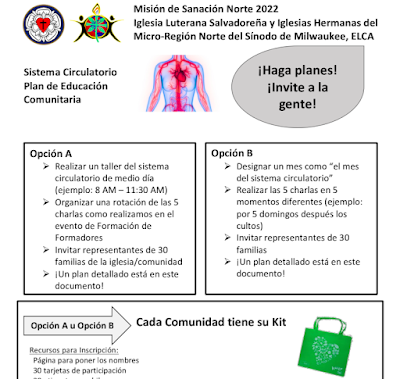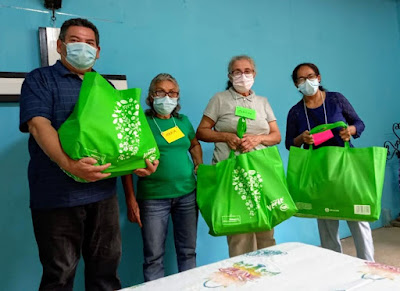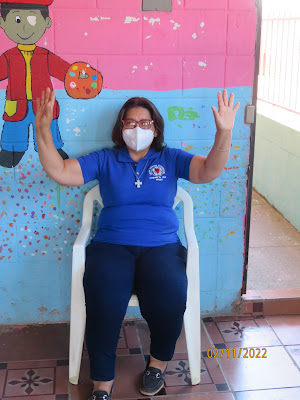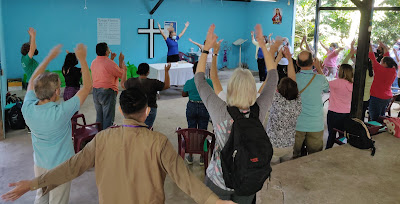Do What You Can Do: A Mission of Healing Story in Several Parts
The pandemic brought lots of changes to the way we could do ministry together, locally and globally. In 2020, we put on the Mission of Healing North Family Wellness Fair just before COVID locked down the world. In 2021, we did a year-long, remote, community education event. In 2022, we jumped into a new era of community health education in El Salvador and created a training event called "Formación de Formadores" (we used "Teach the Teachers" in English).
2022 Teach the Teachers Event
Curriculum Development
As I mentioned in the previous installment of the Teach the Teachers story, the Salvadoran Lutheran Church Health Ministries Coordinator, Pastor Conchi, suggested we develop curriculum for the Mission of Healing North Teach the Teachers workshop with a focus on each of 4 human body systems: Digestive, Circulatory, Respiratory and Reproductive. We started by planning the general information charla for each system. We created big colorful posters and simple line diagrams on which participants could write notes and color. Beyond anatomy and physiology, the 90-minute general charlas included interactive discussions about common problems, risk factors, symptoms, solutions (home remedies and medical), signs of emergency, common medications and how to use them (if applicable), and prevention.
 |
| In this photo, participants study anatomy and physiology of the Circulatory System (an example of a line diagram handout is in the foreground; the diagrams were created to use with adults or children) |
For each body system, we created a series of 25-minute break-out session charlas which included a yoga charla, a reflexology charla and a family Bible Study which related to that body system theme. Two additional charlas were developed for each body system, based on specific health education needs relating to the system (examples: Hypertension for the circulatory system and Breast Health for the reproductive systems). We divided participants into small groups and used a rotation model for the break-out charlas.
 |
| Yoga exercises for improving circulation |
During the Teach the Teachers event, the health promoter trainees participated in the charlas in the same ways that their local community members would - that is, as students. Each promoter had the same student folder full of handouts that their community members would receive. This enabled the health promoters to see everything from the student perspective and offer good suggestions and critiques.
 |
| Health promoters as students |
At the end of each body system training day, the promoters received the lesson plans and teaching resources they would need to implement a replica event. During Teach the Teachers, we did not use anything which the health promoters did not receive in their teaching materials or could make themselves. We did not use projection or videos or any supplies that would need to be purchased. However, we did want to push back a little bit on being completely "old school." Recognizing that the majority of younger people watch videos on their phones, we created supplemental videos on YouTube and put the QR codes onto participant handouts.
 |
| Checking out the QR codes. During lunch breaks, we helped those who were interested in learning how to use the codes. |
During 2021, we learned that some churches did not use the materials we developed because they did not have trained leaders (or leaders were not confident in their training) or saw references to videos on YouTube in the materials but have no cell signal at their church. We learned that for some leaders, not being able to implement a lesson plan EXACTLY as written made them not want to try. When we wrote lesson plans for 2022, we were VERY careful to list optional ideas at the end of lists, to repeat and repeat that technology was not required. We used the words "flexibility" and "optional" frequently, and we included spaces for health promoter trainees to write their own ideas into the lesson plans.
Multiplying the Knowledge in Community-Based Workshops
The health promoter trainees participated in Teach the Teachers with the understanding that they would implement replica events in their communities for each body system. The community events were designed for participation of 30 adults (or involvement of 30 families). Each community team of health promoters received 30 participant folders pre-stuffed with all the handouts, 30 sets of name tags, registration papers, craft supplies, pens or pencils - really everything materially needed in order to make a replica event happen. The resources were organized into big green bags which we called "community kits."
Just 3 weeks before the Teach the Teachers event, we made a key adjustment to the master plan. During Sunday worship (which my husband and I attended), Pastor Francisco talked about the Los Héroes church committee's strategy for 2022: Sunday morning would be THE focus time for church programming and would include Bible School for kids, worship, and an extended time after worship for meetings or family education. Folks would still make it home in time for lunch.
Church life in El Salvador is really similar to church life everywhere: people have work (the work week is Monday through Saturday til noon), school, and family commitments. Plus, in El Salvador, there are all kinds of complicated safety concerns. Churches have to adapt. I messaged some pastors in the northern region and asked if it would be easier to do health charla replicas in small bites, maybe for a half-hour or hour each week over a few weeks. Maybe schedule "Digestion Month" or do some of the charlas with youth and some with adults. I got lots of positive feedback. Flexibility would once again a key for success.
 |
| The Community Implementation Plan - a flexible plan for getting more health education to more families at the community level |
We developed a very helpful document which we included in the health promoter teaching materials for each body system: The Community Implementation Plan. In the plan, we spelled out what the community event could look like if it were done in one day with all of the charlas, or if it were broken into segments. We listed the contents of the community kit, and what components were needed for each charla and how to use the contents for one big event or a group of small events. On the first day of Teach the Teachers, we spent some time talking about flexibility with implementing the community health education workshops, and once that door was opened, the health promoters were much more comfortable with the idea of running education events on their own. Our motto became: Do what you can do. Ask for help with what you can't do. If you can't find help, just skip it. The important thing is: Do what you can do.








Comments
Post a Comment